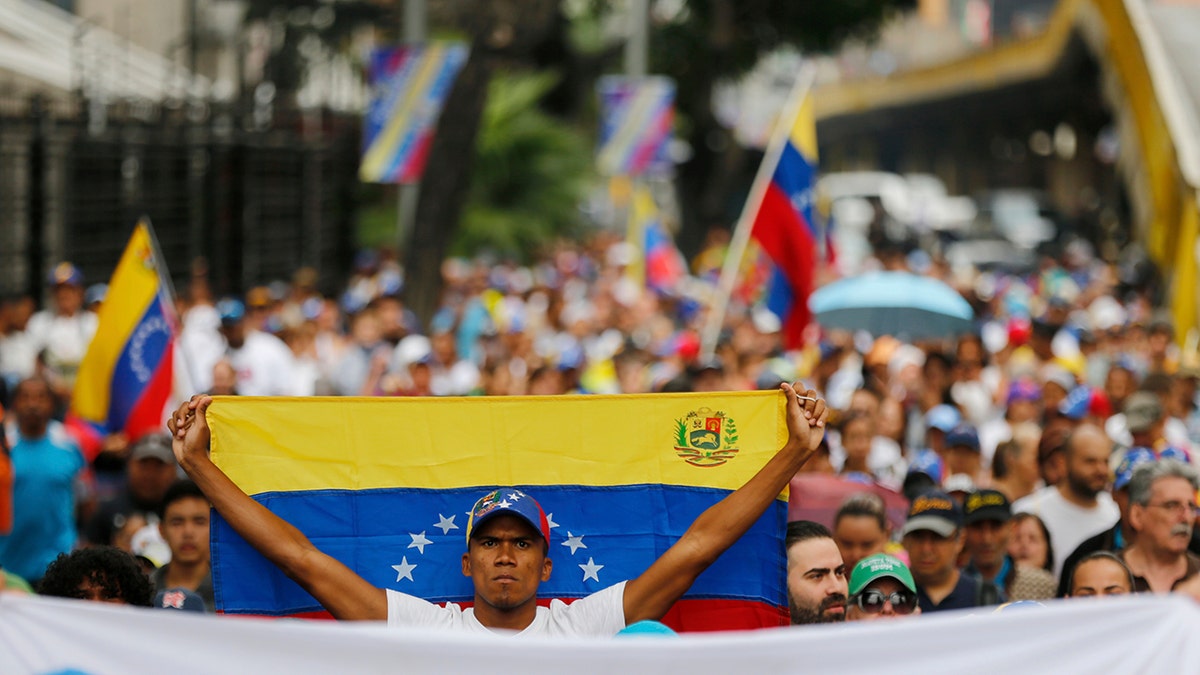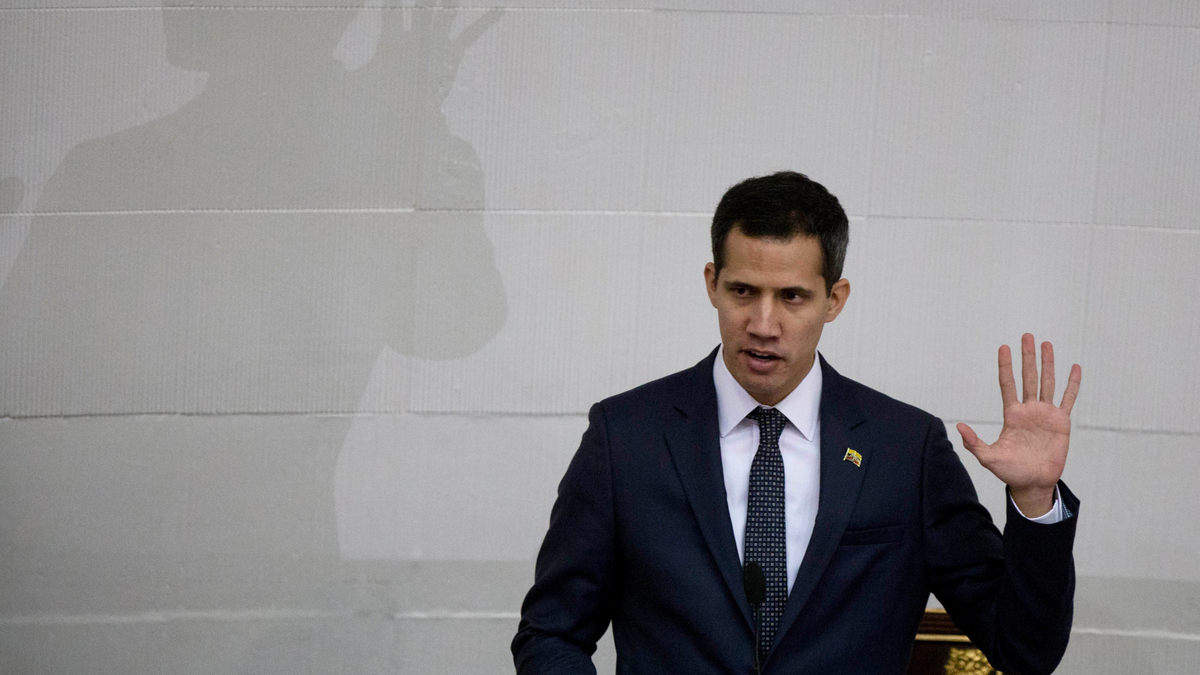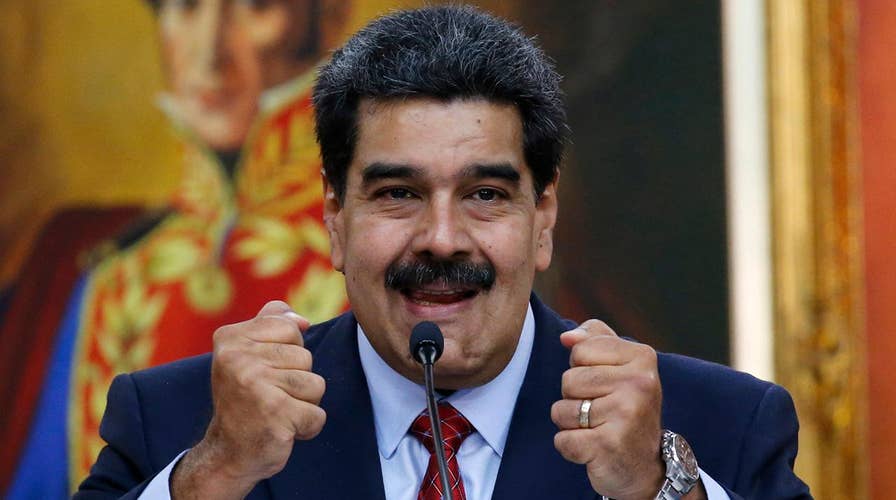When can Venezuela expect ousted President Maduro to step down?
Asymmetrica CEO Vanessa Neumann says that constitutionally opposition leader Juan Guaidó is the new president of Venezuela.
As most of his cohorts in the Venezuelan Embassy in Washington hastily burned documents and packed their bags last week, military attaché’ Col. Jose Luis Silva instead became the first high-ranking officer to defect since opposition leader and head of the National Assembly, Juan Guaido, formally challenged Nicolas Maduro for the nation’s leadership last week.
“Please brothers, don’t attack our people. The state gave us arms to protect our country, not to touch our equals,” Silva declared in a video on Saturday, calling on Venezuela’s armed forces to halt the violence against protesters and to advocate support for Guaido rather than Maduro.
Guaido, with the full backing of the Trump administration, took an oath of office during a street demonstration in the capital of Caracas last week, and declared himself interim president. A number of countries who had deemed Maduro an illegitimate leader following last year’s allegedly sham elections have, like the U.S., chosen to recognize Guaido.
Defense Minister Vladimir Padrino has since deemed Silva “a traitor.” But while the military has so far remained the side of the Maduro regime, opposition groups say cracks are steadily surfacing.
“There are huge, huge consequences when it comes to what happens with the armed forces, and it’s a matter of getting to small Maduro ring which is essentially just nine generals,” explained exiled former Venezuelan National Assembly leader, Julio Borges, who was departing Bogota, Colombia to meet with Washington officials on Monday. “The plan needs to be to put a lot – a lot – of pressure on these most influential nine generals to break the loyalty to Maduro. That loyalty is fragile, so we can see a change (of power) happening in the near future.”
Another former Venezuelan intelligence official closely monitoring the situation told Fox News there have been small signs of change, such as a number of registered police and low-ranking military officers who have abandoned their posts, or refused to undertake “repressive actions” against protesters. Some officers and soldiers have even joined the protests themselves.
“Maduro is aware this is happening; and has brought in more Russian military contractors to protect Maduro,” the source said, estimating that roughly 400 Russians had been brought in over the past week.
Noris Argotte, a Caracas-based journalist, told Fox News on Monday of a “rising level of lower-ranked officials deserting and fleeing the country to either Brazil and Colombia.” But he said it was still “unrealistic” to assume the military will immediately abandon Maduro.
“Rather, it will be a very step-by-step process and it will depend on the higher ranks of officials and their willingness to accept a transition,” she said.
INSIDE THE VENEZUELAN PROTEST MOVEMENT: 'THIS IS OUR CHANCE!'
COLOMBIA’S PEACE AGREEMENT BLOODIED BY DISTRUST, DRUGS - AND THE VENEZUELAN REGIME
Maduro on Sunday boasted the allegiance of the Venezuelan military, roaring to scores of uniformed soldiers who bowed before him at a base in the city of Valencia, against the backdrop of a military parade intended to be a “show of force” to opponents. “Are you coup plotters?” he chorused, to which the soldiers – as portrayed on state media channels – responded with a vigorous “no.”
Maduro’s government has since embarked on an online publicity campaign, summed up with the tagline “Always Loyal, Never a Traitor” in the quest to deter others from following Silva’s footsteps.

An opposition member holds a Venezuelan national flag during a protest march against President Nicolas Maduro in Caracas, Venezuela, Wednesday, Jan. 23, 2019. Venezuela's re-invigorated opposition faces a crucial test Wednesday as it seeks to fill streets nationwide with protesters in an appeal to the military and the poor to shift loyalties that until recently looked solidly behind Maduro's government. (AP Photo/Fernando Llano)
Meanwhile, Guaido and his champions have been hastily handing out copies of a law newly drafted by the National Assembly pledging amnesty to those who switch their support from Maduro to the transitional government.
“There has been some military from lower ranks who are wanting to or trying to, turn against Maduro. But there are several problems. The first is that the top hierarchies in the military will not turn because they are the best-paid government personnel in Venezuela and have a lot of privileges and immunities by keeping their loyalty,” Miguel Mandrade, an international relations analyst in the western Venezuelan city of San Cristobal noted. “There are also members of non-state actors like the Colombian FARC or Hezbollah who have infiltrated the Forces, so there is a fear among the lower ranks of military personnel that repercussions of rebellion could come at them from all sides.”
The third major factor complicating an immediate military turn, according to several Venezuelan analysts and officials, is Cuba’s murky involvement in the Venezuelan armed forces. Both governments deny Cubans have infiltrated the Venezuelan military, despite what some see as obvious signs to the contrary.
Venezuela established close ties with Cuba in the late 1990s, when Maduro predecessor Hugo Chavez was in power. Cuba has since invested in and propped up the Venezuelan military and intelligence wings, according to many observers. And some estimates have indicated as many as 20,000 Cubans could be in the ranks of the Venezuelan security apparatus.
There are “up to five hundred Cubans are in strategic positions,” one Venezuelan intelligence source suggested. And perhaps most crucially, top-notch Cuban intelligence agents are said to hold key leadership positions in Venezuelan intelligence, making it much harder for the opposition to organize.
Nonetheless, Guido has called on Venezuelans to continue the protests, to continue the momentum for change.
After severing U.S. diplomatic ties last Wednesday, Maduro ordered the embassy must be shuttered, and all diplomats expelled by Saturday. However, the U.S. responded by stating they no longer recognize Maduro as a legitimate authority. Maduro has since extended the time frame to 30 days.
Ignoring the demand – with the exception of ordering the evacuation of non-essential personnel late last week amid rising tensions – the State Department on Sunday said it had instead accepted Guaido’s designation of exiled opposition leader Carlos Vecchio as Venezuela’s top diplomatic position of Charge D’Affaires to the United States.
Since 2015, and as a result of the Chavez-introduced socialist policies, Venezuela has spiraled from the wealthiest nation in Latin America into one of extreme poverty and a humanitarian crisis – characterized by mass hyperinflation and critical food and medical shortages – prompting almost four million to flee into neighboring nations.
According to Guillermo Aveledo, a political science professor at the University of Caracas, it could be taken as a sign that there is some internal stirring of discontent within the security forces given that there is “a strange lack of militarization of urban territories and streets, common in a situation like this, which can either be attributed to lack of morale by soldiers, or a desire to promote chaos to hold onto power.”
“The Amnesty Law decreed by the National assembly and confirmed by Mr. Guaido are trying to give Military officers a heroic way out if they turn against the government, but so far just a few officers have done so, with no troop support so far,” he lamented. “It is a possibility that the military will turn, but right now, one fails to see how the situation can play differently this time.”

FILE - In this Jan. 5, 2019, file photo, Venezuelan lawmaker Juan Guaido takes the oath of office as president of the National Assembly in Caracas, Venezuela. A coalition of Latin American governments that joined the U.S. in quickly recognizing Guaido as Venezuela’s interim president, and not Nicolas Maduro, came together during weeks of secret diplomacy. (AP Photo/Fernando Llano, File)
Mass protests in 2014 and 2017 calling for Maduro to step down also failed to institute new leadership. Other activists on the ground expressed disappointment the military hadn’t seized the moment, and flipped already.
“Of course, there are lots of them who want to turn on the government, but it is pretty difficult,” noted Caracas-based filmmaker and political activist, Cesar Oporeza. “Still, strangely enough, it seems to be they want to die with their boots on. It’s weird, but it is happening.”









































